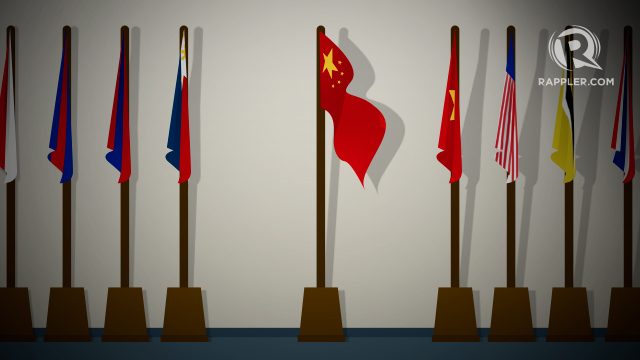SUMMARY
This is AI generated summarization, which may have errors. For context, always refer to the full article.

BEIJING, China – Despite being the biggest trading partner of the Association of Southeast Asian Nations (ASEAN), China suffers from a “trust deficit” in the region.
This is one of the “challenges” that the economic superpower faces and needs to hurdle, an official from the Chinese foreign ministry, who spoke on background, said on Monday, September 1.
ASEAN is China’s third largest trading partner even as Beijing targets trade between the two countries to hit US$1 trillion in 2020.
In 2002, “mutual investments” amounted to $33 billion, ballooning to over $120 billion in 2013.
The goal is for Chinese investments in ASEAN to reach $100 billion in 2020.
How to regard China?
Because there are mutual interests at stake, China needs to better understand ASEAN concerns, including the regional group’s “reasonable concern” about “what kind of power” China will be.
But ASEAN as a group of 10 countries with diverse political systems and levels of development, and which aspires for integration in 2015, must also think about how it will deal with China.
“What kind of China do you want?” ASEAN has to figure out for itself.
ASEAN groups Brunei, Cambodia, Indonesia, Laos, Malaysia, Myanmar, the Philippines, Singapore, Thailand, and Vietnam.
While some say it would be best for ASEAN to depend on China for economic needs, and on the US for security, this may not be a viable or good option, observers of the region have said.
For its part, China “needs to be more sensitive to ASEAN concerns” and work to “deepen interdependence, economically and culturally.”
Territorial, maritime disputes
Of late, China has been embroiled in territorial and maritime disputes in the South China Sea with the Philippines and Vietnam.
The Philippines has brought its case to the United Nations-backed arbitral tribunal, which China has refused to recognize because it prefers a bilateral approach to the issue.
It supports a “dual-track” approach, as referred to by Chinese Foreign Minister Wang Yi after the ASEAN-China Foreign Ministers Meeting in Myanmar last August.
It involves friendly consultations and negotiations done peacefully, and China and ASEAN countries jointly maintaining peace and stability in the South China Sea, Wang had explained.
China wants a Code of Conduct in the South China Sea on the basis of consensus.
At the Myanmar summit, the Philippines urged fellow ASEAN member-countries to back its proposed Triple Action Plan (TAP), citing increasing “aggressive and provocative” actions in the South China Sea that threaten regional peace and prosperity.
Indonesia has offered to mediate among countries involved in the disputes to stave off the escalation of tension.
A meeting will be held in Indonesia this coming October between ASEAN countries and China to reach some agreement.
The Chinese ministry official said, “It is totally wrong to say China is insincere about the Code of Conduct.” – Rappler.com
Add a comment
How does this make you feel?
There are no comments yet. Add your comment to start the conversation.